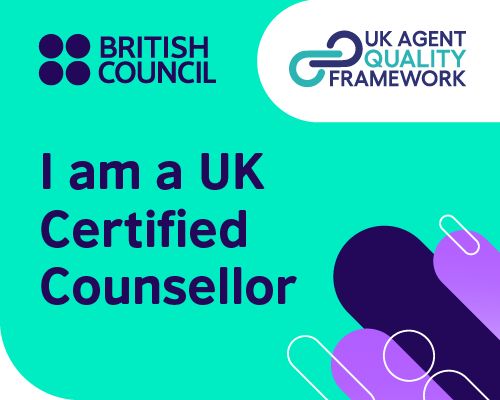In early September 2024, the British Council launched a new digital badge for counsellors and education agents who complete the updated UK agent and counsellor training course. The course is free, and when successfully completed the user automatically receives a badge stating ‘I am a UK Certified Counsellor’. They also have the option of being listed on the British Council’s public database of agents and counsellors.

The British Council says that the aim of the new badge is to “allow those who are certified to share their achievement and show that they have understood the UK’s National Code of Ethical Practice for Education Agents“, and that they “have the expected knowledge and awareness of the UK as a study destination”. The badge is valid for two years and is awarded to individuals, rather than any organisation of business that they are a part of.
It’s a good initiative…
It is estimated that approximately 45-55% of international students seeking to enroll in a UK educational institution seek the assistance of an education agent. The majority of education agents act professionally and honestly and provide a valuable service to prospective international students and their families. The BC’s move to support education agents to improve their knowledge in order to provide a better service to students is overall a good one.
…but what are the risks?
Unfortunately, some education agents do not behave honestly. Misconduct by education agents is all too common, and the financial and psychological impact on international students and their families is devastating.
The British Council certification and badge purport to provide public proof that an education agent understands the course content, but that knowledge and understanding only provides a benefit to international students if it is actually implemented by agents. The British Council grappled briefly with this distinction in its launch statement:
The British Council hopes it will give international students and their parents confidence that they are working with a counsellor who has the knowledge and awareness of the UK as a study destination and understands the UK’s ethical code of conduct, however those who obtain the badge are not formally endorsed, accredited or validated by the British Council. (Emphasis added.)
A risk with new badge is that it will lead students and their families to believe that the British Council has certified both an agent’s understanding of, and compliance with, it’s training. Even for a native English speaker the distinctions that the BC seeks to make between ‘certified’, ‘endorsed’, ‘accredited’, and ‘validated’ are quite fine. The majority of those working with agents offshore will not be in a position to split those hairs. There is a good chance that many will take the certification badge displayed by an agent as a general stamp of approval of that agent by the British Council.
The problem could deepen in cases where there is a divergence between the badge/certification held by an agent and their conduct. Will the British Council have a process to identify and respond to evidence of misconduct by a certified education agent that shows that in practice they are not abiding by the National Code of Ethical Practice for Education Agents? If not, agents engaging in misconduct will retain the benefit of the BC certification badge and public listing on the British Council’s public database of certified agents and counsellors, and could seek re-certification when their current badge expires. In these circumstances – and yes, we are only talking about a small minority of agents – the worthy goals of the BC certification badge will be undermined. Instead of providing assurance to students and their families, it could mislead them by providing a cover of legitimacy and official approval to a dishonest agent who is looking for their next victim.
Working with education education agents?
AgentBee’s education agent due diligence solution supports educational institutions to implement best practice education agent due diligence processes.
Educational institutions can use it to:
- protect students – conduct initial and ongoing due diligence checks on education agents.
- protect your brand – detect cases of unauthorised agents using your institution’s name, logo or other IP without permission.
Our clients include…
Get new posts…
Follow AgentBee on Linkedin to get our latest posts on education agents as they drop – (click the icon below)

Sources: British Council, ICEF

